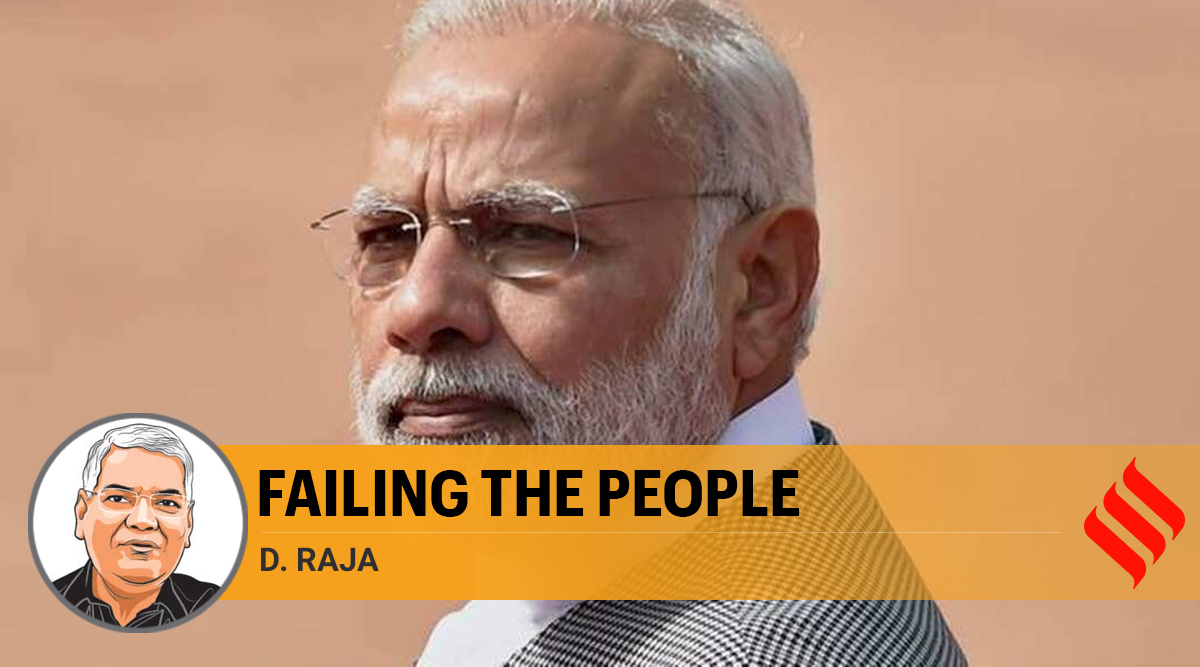 The first five years of the Narendra Modi government were marked by two major steps — demonetisation and GST
The first five years of the Narendra Modi government were marked by two major steps — demonetisation and GSTThe politics of the RSS-BJP combine is responsible for the current state of the economy — the unprecedented decline of the GDP to -23.9 per cent — and the immiseration of the country’s toiling people. Barely a year ago, Finance Minister Nirmala Sitharaman said that the goal of a $5-trillion economy by 2024-2025 was realisable. Last week, the FM invoked the notion of an “act of God” while shrugging off the Centre’s responsibility of payments to states under GST.
There is no doubt that COVID-19 has engulfed the entire world in just a few months. The closure of industrial units and the complete halt of air, rail and road traffic added to the woes of an economy under strain. But the government had received several warnings about the looming crisis. The CPI had warned it about a recession and pointed out that the so-called reforms — commercialisation of education and health, privatisation of public sector undertakings, reckless liberalisation to allow foreign capital in virtually every sector — are not the solution to what ails the economy.
The first five years of the Narendra Modi government were marked by two major steps — demonetisation and GST. Demonetisation ruined the informal sector, caused immense misery to the poor and failed in curbing corruption, terrorism and black money — its ostensible aims. GST delivered a blow to the MSME sector, cut into the revenues of states, undermined the federal spirit of the country’s polity and made states dependent on the Centre’s mercy. Today, when state governments unable to pay salaries, the Centre advises them to take loans from the RBI.
State governments had to give up 60-70 per cent of their taxing powers, including the entire VAT regime, to usher in GST. They did so on the Centre’s assurance of compensation for the shortfall due to GST collection for five years.
The global financial meltdown of 2008 exposed the realities of the neoliberal order. During the debate on this issue, the then Finance Minister Pranab Mukherjee and the then Prime Minister Manmohan Singh claimed that the fundamentals of the Indian economy were strong enough to withstand the impact of the crisis. They also acknowledged the role of public sector banks and financial institutions. This crisis was triggered by the collapse of the two financial institutions because of excessive lending and failure in getting the loans repaid. NPAs are today the major problem faced by the banking sector. The Modi government has failed to take tangible action to recover these loans.
The COVID-19 lockdown was declared in the last week of March, even though India reported its first infection at the end of January. The government was busy making preparations for US President Donald Trump’s India visit. The BJP and RSS were aggressively breaking anti-CAA protests across the country, especially in Delhi, and polarising the people on communal lines.
Pseudo nationalism is being used to restrain resistance to such misrule, to stifle dissent. The federal character of the polity is being destroyed. We know of the almost summary abrogation of Article 370. The Citizenship Amendment Act is a blow to the Constitution’s secular character. The dilution of reservations for marginalised people shows the government’s lack of commitment to the principles of social justice enshrined in the Constitution. At the same time, there is no let-up in the atrocities against people from SC/ST communities. Despite daily COVID-19 cases crossing 70,000 and opposition from many state governments, students are being forced to appear in all-India examinations like the JEE and NEET.
Faced with an insensitive government, the people should not be made to feel insecure. The Left should mobilise people and lead them in the struggle against this pro-corporate and communal government. At a time when right-wing ideologues declare that there is no opposition in the country, the Left should unite all secular democratic forces.
This article first appeared in the print edition on September 8, 2020 under the title ‘Failing The People’. The writer is general secretary, CPI